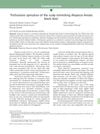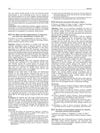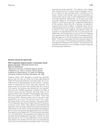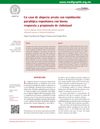 8 citations,
August 2016 in “Acta dermato-venereologica”
8 citations,
August 2016 in “Acta dermato-venereologica” Timolol eye-drops can cause hair loss.
8 citations,
January 2017 in “Dermatology online journal” Tofacitinib helped psoriasis but not alopecia universalis, needing more research.
 8 citations,
July 2014 in “Anais Brasileiros de Dermatologia”
8 citations,
July 2014 in “Anais Brasileiros de Dermatologia” A man's scalp condition was misidentified as hair loss dots but was actually a common follicular disorder.
 7 citations,
October 2019 in “Klinická onkologie”
7 citations,
October 2019 in “Klinická onkologie” Cancer treatments often cause hair loss and damage, affecting patients' mental health.
 7 citations,
April 2021 in “British Journal of Dermatology”
7 citations,
April 2021 in “British Journal of Dermatology” Topical tofacitinib may effectively and safely regrow facial hair in some people with alopecia areata.
 5 citations,
January 2021 in “Inflammatory Bowel Diseases”
5 citations,
January 2021 in “Inflammatory Bowel Diseases” Tofacitinib improved ulcerative colitis, skin ulcers, and hair loss in a patient who didn't respond well to other treatments.
 4 citations,
September 2022 in “Dermatologic Therapy”
4 citations,
September 2022 in “Dermatologic Therapy” Baricitinib helped some patients with tough-to-treat hair loss regrow hair, but more research is needed on its safety.
3 citations,
April 2023 in “Dermatologica Sinica” PRP treatment may help with alopecia areata, especially in newer cases.
 3 citations,
August 2020 in “Case Reports in Dermatology”
3 citations,
August 2020 in “Case Reports in Dermatology” Tofacitinib treatment significantly improved a patient's psoriasis, psoriatic arthritis, and alopecia universalis.
 3 citations,
March 2020 in “International Journal of Dermatology”
3 citations,
March 2020 in “International Journal of Dermatology” Tildrakizumab showed limited effectiveness in treating chronic alopecia areata in a small group of patients.
 2 citations,
September 2011 in “Pediatric Dermatology”
2 citations,
September 2011 in “Pediatric Dermatology” The document suggests there might be a link between Kawasaki Disease and Alopecia Areata that needs more research.
2 citations,
June 2017 in “ScienceRise” A mask-cream with herbal extracts was successfully developed for treating hair loss.
1 citations,
July 2017 in “Skin Appendage Disorders” A woman developed permanent hair loss after a face-lift surgery despite various treatments.
1 citations,
January 2021 in “Dermatologic Therapy” Candida antigen is an effective and promising treatment for alopecia areata.

Baricitinib therapy helped many patients with severe alopecia regrow hair after 52 weeks.

Alopecia patients in the UK want more empathy and better care from healthcare providers, including more GP training on alopecia and improved care pathways.
 September 2009 in “European journal of paediatric neurology”
September 2009 in “European journal of paediatric neurology” Biotin supplements did not significantly reduce hair loss in rats on valproic acid.
 October 2024 in “American Journal of Case Reports”
October 2024 in “American Journal of Case Reports” Baricitinib improved hair loss and arthritis in a lupus patient.
 June 2023 in “British journal of dermatology/British journal of dermatology, Supplement”
June 2023 in “British journal of dermatology/British journal of dermatology, Supplement” Congenital alopecia areata may have genetic links and topical corticosteroids are an effective treatment.
 July 2022 in “Research, Society and Development”
July 2022 in “Research, Society and Development” The conclusion is that different treatments improved hair growth in dogs with Alopecia X, but results varied and not all dogs had complete hair regrowth.
 February 2021 in “Cureus”
February 2021 in “Cureus” A woman's hair loss was initially misdiagnosed as scarring hair loss but was actually a treatable autoimmune hair loss.
 April 2020 in “Trends in Immunotherapy”
April 2020 in “Trends in Immunotherapy” Combining triamcinolone acetonide and immunotherapy can help regrow hair in some alopecia totalis patients.
 March 2020 in “Faculty Opinions – Post-Publication Peer Review of the Biomedical Literature”
March 2020 in “Faculty Opinions – Post-Publication Peer Review of the Biomedical Literature” Combining nonablative fractional laser with minoxidil was effective for alopecia areata with only one patient relapsing after a year.
July 2019 in “Dermatology practical & conceptual” The study found that alopecia areata is strongly linked to autoimmune diseases and may indicate a genetic predisposition to such conditions.
 March 2018 in “Trends in Immunotherapy”
March 2018 in “Trends in Immunotherapy” Combining triamcinolone acetonide with immunotherapy can help regrow hair in some alopecia totalis patients.
April 2017 in “Al-Azhar Medical Journal” PRP is an effective and safe treatment for alopecia areata.
 February 2017 in “Medicina cutánea ibero-latino-americana”
February 2017 in “Medicina cutánea ibero-latino-americana” An 8-year-old boy with hair loss had hair regrowth and responded well to clobetasol propionate treatment.
 April 2016 in “Journal of The American Academy of Dermatology”
April 2016 in “Journal of The American Academy of Dermatology” The study found that severe alopecia areata affects any age, treatments often give temporary results, and some factors predict worse outcomes.
 August 2015 in “Dermatología Argentina”
August 2015 in “Dermatología Argentina” Frontal fibrosing alopecia causes hairline recession and eyebrow loss in postmenopausal women.
January 2020 in “International Journal of Trichology” Androgen-producing ovarian tumors can cause male-pattern hair loss in women.






















